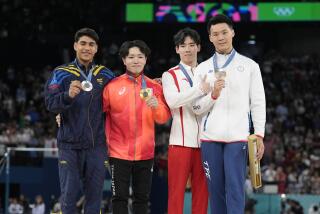Beijing Win No Moral Victory
- Share via
MOSCOW — The last time, before Friday, that a Beijing Olympic bid committee appeared before the entire IOC to ask for the Summer Games was in 1993 in Monte Carlo. The Chinese lost by two votes. As later revealed, Sydney supporters wooed two African voters the night before the election with offers of $35,000 each.
That is as good an argument as any for bribery. IOC President Juan Antonio Samaranch reiterated in his speech opening this session Thursday night at the Bolshoi Theater that the Australians organized the best Games ever.
In fact, however, two voters who’d presumably shifted their support to Sydney hadn’t made the difference in Monte Carlo. The many voters who’d refused to support Beijing, because of the Chinese government’s repressive human-rights policies, had.
What has changed in the eight years since? It certainly hasn’t been the Chinese government, at least not in regard to human rights. Amnesty International reported last week that China has executed 1,781 people in the last three months--more than the rest of the world combined in the last three years--for crimes ranging from prostitution, drug use and stealing gasoline to murder.
When asked about that report here, Wang Wei, secretary general of Beijing’s bid, has responded that China isn’t alone in authorizing executions.
That is true. The U.S. government, in dealing with human-rights activists, is often asked to justify its policies on the death penalty.
But, besides its liberal use of the death penalty, China also restricts religious and personal freedoms and has been accused of selling organs of executed prisoners. By any socially acceptable standards, there is no justification for China’s record on human rights.
Beijing’s bid committee, which answers to the government, was so insensitive to the issue that it proposed that beach volleyball be played on Tiananmen Square, where a pro-democracy movement met with a violent end at the hands of the Chinese military in 1989. That plan has been withdrawn, but committee members say it’s possible that triathletes will run through Tiananmen.
Only one thing has changed in the eight years since Monte Carlo.
A majority of IOC members now believe, as some did in 1993, that their decision Friday to award the 2008 Summer Games to Beijing will improve human-rights conditions in China.
So certain are they of that they gave Beijing a second-ballot victory over strong contenders Toronto and Paris. It was the most convincing victory for the Summer Games in more than 20 years, since Los Angeles won the 1984 Olympics on the first ballot as the only candidate, Tehran having withdrawn when the Ayatollah Khomeini came to power.
It is easy to conclude with this latest vote that the IOC is unconscionable. That is not fair. Most of the IOC members who spoke to the media after the vote described the struggles they had with their consciences as they considered Beijing’s bid. In the end, those who voted for the Chinese said they believe they made the morally correct choice.
Their argument is that awarding the Games to Beijing will guarantee that the Chinese government comes under seven years of intense, unprecedented scrutiny from someone other than Amnesty International.
IOC Vice President Dick Pound of Canada said, “You have to ask yourself whether your objective is to accelerate the process of reform in China or to sit back and do nothing.”
With that philosophy, the IOC would have voted for Tehran over Los Angeles for 1984 as an enticement to the ayatollah to change.
The sentiment might be well intentioned.
It is also delusional.
That is hardly a new condition for the IOC. But its record as a moral lighthouse has been, at best, mixed. From its support of the Nazi Olympics in Berlin in 1936, to its silence on the massacre of protesting students in Mexico City in 1968, to its failure to formally memorialize the deaths of Israeli athletes at the hands of Palestinian terrorists at Munich in 1972, to its own recent corruption scandal, the IOC is hardly a paragon of virtue.
(After the formal presentations Friday, not one IOC member asked Beijing’s bid committee about human-rights violations. In contrast, Toronto’s bidders were asked two questions about a crude, racist crack made by the city’s mayor. Not that he should be defended, but at least he didn’t execute anyone.)
On the other hand, the IOC was among the first international bodies to take a firm stance against South African apartheid. Interestingly, the IOC waited until that country had reformed before allowing it to rejoin the Olympic family.
In China’s case, the IOC suddenly is pro-active, leaving itself open to speculation that it is responding to the corporate interests of sponsors who are enthusiastic about more open access to a nation of 1.3 billion potential consumers.
But even if the IOC is indeed planting its flag in the moral high ground, there is no guarantee that a Beijing Olympics will further the cause of a free and open society in China.
Henry Kissinger, who is in Moscow for the session, is a friend of the Olympic movement, but he also has operated in the real world. He said that Friday’s vote will result in, at best, modest change in China.
At worst, it will serve as validation for the Chinese government that it can gain acceptance from the world at large, despite its human-rights record, and the abuses will continue.
In that case, do the Olympics still belong in China?
Even some IOC members who voted for Beijing no doubt would answer in the negative. The real fear for them is that governments, particularly in the West, will come to the same conclusion within the next seven years and perhaps, incited by another spy-plane incident, call for a boycott. It has happened before.
I couldn’t help but think about that while talking to Anita DeFrantz, an IOC vice president from Los Angeles, in the lobby of the Bolshoi on Thursday night. She looked across the street at the Kremlin, where a tragic decision was made in 1979 to invade Afghanistan, and talked about the White House, where in response, an unwise decision was made to boycott the 1980 Moscow Games.
That decision cost DeFrantz, a bronze medalist in rowing from 1976, the privilege of competing in a second Summer Games.
“Twenty-one years later, it still hurts,” she said. “You never get that opportunity back.”
It is ironic that the IOC returned to Moscow to make a decision that could lead the Olympic movement down an equally perilous path.
(BEGIN TEXT OF INFOBOX / INFOGRAPHIC)
Summer Olympics
Sites
1896 Athens
1900 Paris
1904 St. Louis
1906 Athens*
1908 London
1912 Stockholm
1920 Antwerp, Belgium
1924 Paris
1928 Amsterdam
1932 Los Angeles
1936 Berlin
1948 London
1952 Helsinki
1956 Melbourne, Australia
1960 Rome
1964 Tokyo
1968 Mexico City
1972 Munich
1976 Montreal
1980 Moscow
1984 Los Angeles
1988 Seoul, South Korea
1992 Barcelona, Spain
1996 Atlanta
2000 Sydney, Australia
2004 Athens
2008 Beijing
*
* Games not recognized by International Olympic Committee. Games of 1916, 1940 and 1944 were not celebrated because of war.
*
Randy Harvey can be reached at [email protected].
*
RELATED STORY
Beijing 2008: Chinese city easily beats out Toronto to get Summer Olympics for the first time. A1
More to Read
Go beyond the scoreboard
Get the latest on L.A.'s teams in the daily Sports Report newsletter.
You may occasionally receive promotional content from the Los Angeles Times.






